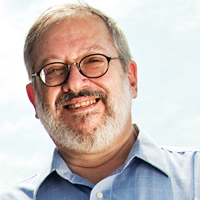
Howard J. Finkelstein
See video below
Howard J. Finkelstein likes to do his own research and draft his own deals. That, coupled with the fact his microfinance clients generally don’t meet traditional BigLaw billing schedules, led the Brooklyn, N.Y., corporate lawyer to start a solo practice after many years in large law firms.
Howard J. Finkelstein likes to do his own research and draft his own deals. That, coupled with the fact his microfinance clients generally don’t meet traditional BigLaw billing schedules, led the Brooklyn, N.Y., corporate lawyer to start a solo practice after many years in large law firms. “I think most law firms have sort of lost the ability to really be entrepreneurial—that is, to take risks—the way they’re run now,” says Finkelstein, 61. “I may have two years of nonpayment, but I know that in two years I’m going to do well.”
Finkelstein’s practice focuses on working with intermediaries that collect funds to invest in microfinance institutions, which provide loans to poor borrowers who are starting or running a small business, and on assisting microfinance institutions to become ready to raise commercial capital.
“We’re evolving into a situation where big institutions are realizing they can make loans not only to people with means but people who have less,” Finkelstein says.
Finkelstein got his first taste of microfinance in 2002 when he led an $87 million deal for BlueOrchard Microfinance Securities. His work there involved structuring the securitization of loans to microfinance institutions in seven countries. Later he did a $60 million securitization for MicroFinance Securities XXEB. That deal involved loans to 30 microfinance institutions in 15 countries.
“He probably pushed people to the end of their comfort zones a couple of times, but it was a lot of fun,” says Penny Zacharias, a senior associate with the Pittsburgh office of Buchanan Ingersoll & Rooney. Finkelstein is a former Buchanan Ingersoll partner, and Zacharias worked with him on the BlueOrchard deal.
“To get that done it truly took an innovative person, somebody who wasn’t afraid to step out of the box and think differently,” Zacharias says. One of the challenges was understanding the pertinent laws and regulations of the various participants’ countries, she says, and they dealt with legal counsel from numerous countries.
“We were the lenders’ lawyers primarily, and they run a very tight ship,” Zacharias says. But some of their restrictions didn’t make sense to parties in places like Bogotá, Colombia. Through all of it, Zacharias says, Finkelstein was a great negotiator.
“He always had this [approach] that this was new but we could pick it up, building on the other experiences we have,” she says. “He gets things very quickly and makes connections really fast.”
Finkelstein left Buchanan Ingersoll to join the New York City office of Akerman Senterfitt. When he left there in December 2008 to start a sole practice, he brought BlueOrchard, headquartered in Geneva, Switzerland, with him. A Brooklyn native who now lives near Marine Park, Finkelstein has an office in his home. He uses Westlaw “sparingly,” and often meets with clients in Manhattan coffeehouses.
“My expenses are relatively minimal. I spend money on things like going to conferences and other networking opportunities,” says Finkelstein, estimating that in the past year he’s spent about $10,000 on travel and lodging. Finkelstein wouldn’t say how much his practice earned, but he estimates his business receipts are about 70 percent higher than they were last year.
“Look, 2009 couldn’t have been a worse year to start a practice,” he acknowledges, “but I figured if I made it through 2009, I’d be fine.”
Some clients pay Finkelstein with task-based billing or by the hour; others pay a monthly fee. For the latter, he says, “you get all the time you want from me.” And in some instances clients pay him with a percentage of their stock.
“I have not yet realized a penny from these,” he says, “but it is very early.”
In June, Finkelstein was putting together a business plan for Puerto Rico’s first microfinance institution.
“It’s very gratifying to be able to work with people who have an idea and want to make it real,” he says. “That’s what I really look for. I want to be part of a growth process.”
View Brooklyn, NY
in a larger map